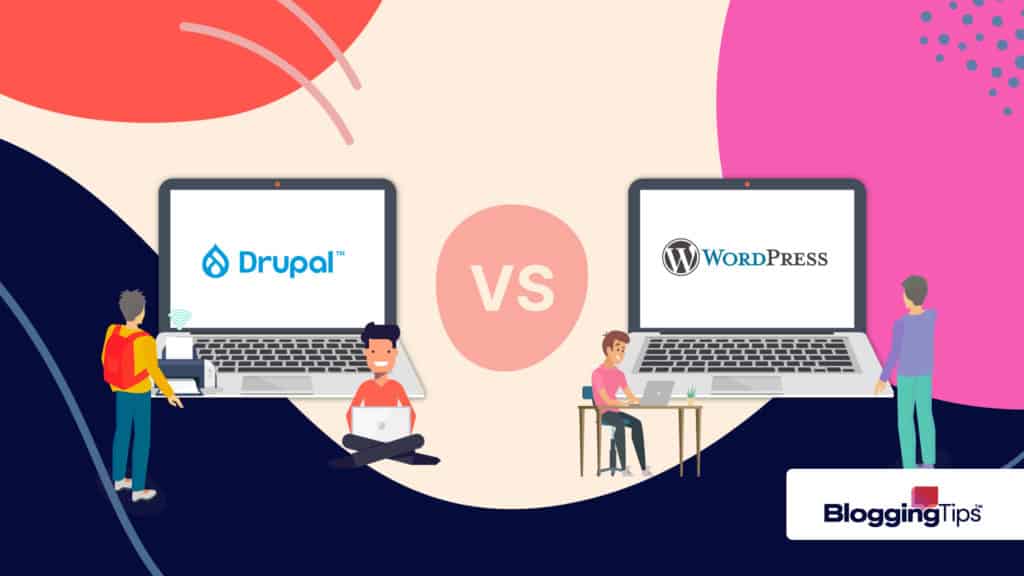When creating your blog or website, you want to ensure that your content is user-friendly and efficient for the viewer.
One of the more essential factors to consider when strengthening your website is the content management system (CMS).
Two primary examples of a CMS software would be WordPress and Drupal.
WordPress is one of the more popular options as it is standard for beginner website creators to use when designing and managing their content.
It has a wide variety of plugins to choose from and has an organized, creator-friendly dashboard so that you can create content with ease.
Drupal is another option that website or blog creators choose to manage their content.
Of course, this type of CMS is for experienced creators as it features more advanced options to edit and create, so it might not be the best option for those beginners just starting in website or blog management.
With Drupal and WordPress, it might be challenging to determine the best CMS for you due to their similar features and uses.
Here we will go over the differences, similarities, and features these systems offer and determine which one is right for you.
Drupal vs. WordPress Overview
When choosing the ideal content management system, aside from alternatives, both Drupal CMS and WordPress CMS are the primary choices in creating a website or a blog.
However, even though they have their similarities, both offer different features.
What is Drupal?
Drupal is a free content management system that website or blog creators use to develop and manage their sites.
Drupal users have access to unlimited features, creating flexible customization methods with its plugins, add-ons, themes, and functionalities.
However, as previously mentioned, due to its complex yet flexible features, the Drupal platform might be difficult to manage if you are a beginner instead of an experienced developer with website design and management.
Despite having to learn the inner workings of the Drupal site, they strive to establish user-friendly solutions for both beginner and experienced Drupal users.
For instance, they implement an installation package to help navigate and edit your content easily.
Another factor is that their new releases help beginner Drupal users figure out hypertext preprocessor (PHP), HyperText Markup Language (HTML), and other features in web design.
What is WordPress?
WordPress is another popular CMS software that developers often use to create their blogs or website.
Its primary features are making web design or establishing your blogging platform easy with its five-minute installation process.
They also strive to promote a user-friendly platform and provide extensive guidance for its WordPress community.
By implementing an easy-to-use software for its users, most beginners or experienced developers prefer this CMS as it’s less complex and more straightforward in its available features and how to navigate and edit content.
Drupal vs. WordPress Advantages
WordPress and Drupal are among the many popular options when choosing CMS software for your website or blog.
However, the advantages of both CMS are often different from one another.
Drupal Advantages
Drupal, most notable for its complex yet innovative software, has various advantages that users can benefit from.
Some of those include the following:
Drupal Commerce
Drupal Commerce is a type of e-commerce software specializing in helping its Drupal user’s content gain more engagement, especially if they are an e-retailer.
It is perfect if you have a small business.
It does feature various Drupal modules further to enhance your engagement activity by offering a variety of ways to customize your content.
Open Source Network
Usually, open source refers to a type of software that’s code is free to edit and modify and is readily available to the public.
It grants Drupal website creators and their developers the opportunity to work in unison, ensuring an efficient work environment and enhancing the drupal community.
Also, since it is open-source, it allows the software to be downloaded without the hassle of purchase, license, or other unneeded fees.
Flexible Content Management
The primary focus of the content creator and developer is that the content itself is adaptable.
In this case, Drupal offers its users the ability to create their content and any add-on functions that might strengthen it overall.
Overall, it provides more than 2,000 drupal themes and over 40,000 drupal modules, so there are plentiful options to choose from that will enhance your content to the fullest!
Ever-Growing Community
Although their software is a bit difficult to navigate if you are a novice, the drupal community provides active forums, upcoming events, news, and a handy guide on managing your content.
You can also ask for guidance from specialists, long-time members, and contributors if you are unsure about some of the features Drupal offers or if you’re having trouble with particular issues and functions.
Efficient and Convenient Software
Aside from its new releases making it convenient to use their software for website or blog content, regardless of experience, Drupal also assists with working with the source code.
With the help of its developers, it’s easier to navigate the more complex features and modify them.
WordPress Advantages
WordPress is synonymous with being the most popular CMS software for websites or blog development.
So, it should go without saying that there are several advantages to using this software for your content.
User Friendly for Beginner Content Creators
Typically, when first working with WordPress, its software is easy to install and manage as it guides you through setting up your website and domain name.
Afterward, you can navigate with ease in managing your content by using their organized dashboard.
This way, customizing your posts, pages, and themes is easily manageable.
Not only that, but WordPress supports any hosting provider, so installing isn’t a hassle to handle.
Enhances Content with Built-In Blog
WordPress is known for its simple customization process for creating content for websites.
However, its software does support customizing blogs as well.
One of the features that enhances this is the built-in blog system.
This helps promote your content’s search engine optimization (SEO).
With strengthening the WordPress SEO, the built-in blog feature helps create new blog posts for updates or new announcements.
Regular Updates and Website Maintenance
One of the benefits of using WordPress for your content is that the software comes equipped with regular upkeep and updates to ensure your website or blog functions properly.
With the updates feature on the dashboard, it will determine what plugins, themes, or add-ons need to be updated without having to troubleshoot on your own.
Easy to Function Plugins for your Content
WordPress offers a copious amount of plugins, precisely over 59, 296, for your content.
The best part about it is that you don’t necessarily have to use their plugins.
This CMS software supports third party plugins as well. WordPress plugins can help your SEO, wp engine, wp core, and other customization options.
Numerous Themes to Choose From
Acquiring a WordPress theme for your website or blog grants you the ability to customize your content however you want.
In contrast to Drupal, WordPress has over 9,630 free themes, but there are premium options if you’re going to enhance your SEO.
It is crucial to know that even though most of their themes are free to use, they might not include essential features that a premium theme would for your WordPress site.
Drupal vs. WordPress Ease of Use
One of the more essential factors to consider when choosing A CMS software is that it’s easy to use.
Some features might be too overwhelmingly tricky, causing the process of creating a website to be intimidating.
Fortunately, there are factors that both Drupal and WordPress include.

Drupal Ease of Use
For Drupal, beginner creators or developers might be overwhelmed due to the complexity of the software itself.
It will require you to train yourself on the inner workings to maneuver Drupal properly.
However, they have recently released new versions of this software, implementing a layout builder feature, so it’s easier to navigate and manage content whether you are a content editor, creator, or developer.
WordPress Ease of Use
As previously mentioned, WordPress is ideal for those who are at the beginner level at creating a website or blog.
You don’t necessarily have to be a developer, as it helps guide you through building your website and learn about the functions and features to use to your advantage.
Some of the features they include would be a user-friendly dashboard, built-in blog, and drag and drop functionality.
Drupal vs. WordPress Customization
The ability to customize your content is essential, making it unique and functional for those viewing your website or blog.
Both Drupal and WordPress offer various customizing options such as plugins, themes, templates, and extensions.
Drupal Customization
Although they have fewer modules and themes to choose from than WordPress, Drupal offers an extensive amount of options for customization.
Their amount of modules are standard, and they can support and strengthen the functions and speed of your website or blog.
However, if you are looking to customize based on your content fully, it will require you to work more on the commanding-line interface.
WordPress Customization
With the help of its plugins and themes, WordPress guides you in creating your content with ease.
Due to its simple and user-friendly dashboard and functions, it is easier for you to edit, create and manage posts and pages without worrying about coding.
You can also modify and edit them to suit your content needs.
Drupal vs. WordPress Security
Advanced security is crucial for any website or blog creator because it prevents technical issues and protects your content from hackers and other harmful malware.
With this in mind, Drupal and WordPress have their solutions when dealing with this factor.
Drupal Security
Drupal might be the leading contender for security because of its high-quality security system.
This is primarily because of its strict, thorough processing of coding, releases, and many factors that deal with plugins and themes.
Even if it has a robust security system, your website or blog is still at risk of hackers or other technical issues if not properly maintained and updated.
WordPress Security
WordPress provides an excellent standing security system.
However, it is known for its vulnerability to cyber-attacks.
Since most platforms use WordPress, it’s more prone to cyber security issues.
Also, since this system is user-friendly for beginners, sometimes, when editing your pages and sites on your own, minor technical issues can lead to hackers.
Drupal vs. WordPress Features
Having features for your website or blog will help in enhancing your content and its engagement.
In comparison, both Drupal and WordPress have features to strengthen your content.
Drupal Features
Due to it complexity, this CMS software has an array of features for your website or blog.
Some of those features include:
- Provides Advanced Security for your Content.
- Enhances personal customer data to strengthen engagement activity.
- Has 2,000 themes and over 40,000 modules to offer.
- New software releases to guide new users.
WordPress Features
Even though it’s software is simplistic, it does offer an assortment of features.
Several of them include:
- User-Friendly Software for Beginner Content Creators and Developers.
- Regular updates and maintenance to maintain content functionality.
- Has 9,630 themes and 59, 296 plugins to offer.
- Built-In Blog feature.
Drupal vs. WordPress Costs
As for costs, both Drupal and WordPress are free to install and use for content creation.
However, if you are looking to enhance your website or blog, there are premium options that do require you to pay.
Final Verdict
So which is best, Drupal or WordPress?
It depends on your level of expertise on website or blog management.
WordPress is better for beginners, while Drupal is better for tech-savvy bloggers.
We suggest doing further research in both of these options to determine which is the right fit for you.
We hope this guide helped you out!






